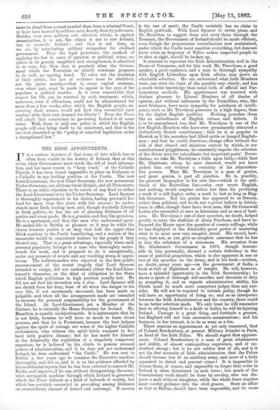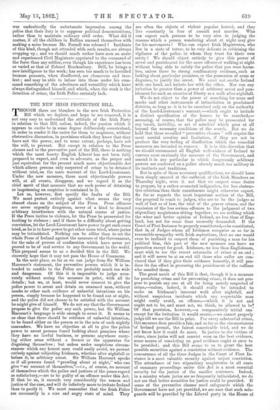THE IRISH APPOINTMENTS.
TT is a curious instance of that irony of fate which has so often been visible in the history of Ireland, that at this crisis, when Government most needs the aid of local informa- tion, and has most reason to " keep touch " of the Catholic Church, it has been found impossible to place an Irishman or a Catholic in any leading position at the Castle. The new Lord-Lieutenant, the new Chief Secretary, the new permanent Under-Secretary, are all from Great Britain, and all Protestants. There is no other objection to be raised of any kind to either the Lord-Lieutenant or to the Under-Secretary. Lord Spencer is thoroughly experienced in his duties, having governed Ire- land for more than five years with fair success ; he under- stands most Irish leading men, and, though decidedly Liberal in Irish politics, he has the art of pleasing Irishmen of all parties and every grade. He is a grandee, and they like grandees. He is a sportsman, and they like men who understand sport. He makes life in Dublin as pleasant as it may be while the chasm between parties is so deep that half the upper class think courtesy to the Castle humiliating, and a section of the remainder would be considered traitors by the people if they showed any. That is a great advantage, especially when such personal popularity belongs to a man who thoroughly under- stands his work, and is prepared to do it energetically, under any pressure of events and any resulting storm of oppro- brium. The bulletin-maker who reported in the first public announcement of the recent tragedy that Lord Spencer intended to resign, did not understand either the Lord-Lieu- tenant's character, or the kind of obligation to the State which English politicians in high position usually feel. He did not see that his invention was a slur. Lord Spencer will not shrink from his duty, least of all when the danger to his own life, if not enormously increased, has been made so palpable, and when all the arrangements made are intended to increase his personal responsibility for the government of the Island. As Lord-Lieutenant, yet a Member of the Cabinet, he is•virtually the Home Secretary for Ireland. Mr. Hamilton is equally unobjectionable. It is unfortunate that he is not Irish, because he will have so much to learn about persons, and that he is Protestant, because the best helpers against the spirit of outrage are some of the higher Catholic ecclesiastics, who witness the spirit lately rampant in Ire- land with positive dismay; but he has made for himself at the Admiralty the reputation of a singularly competent organiser, he is believed by his chiefs to possess unusual powers of administration, and if he does not yet understand Ireland, he does understand " the Castle." He was sent to Dublin a few years ago to examine the Executive machine thoroughly, and did so, and it is on the evidence afforded by his confidential reports that he has been selected to succeed Mr. Burke, and improve, if he can, without disorganising, the some- what antiquated machine through which Ireland is governed, which the Times defends as a kind of bulwark of society, but which has certainly succeeded in provoking among Irishmen an extraordinary amount of hatred and contempt. If success is the test of merit, the Castle certainly has no claim to English gratitude. With Lord Spencer to revise plans, and Mr. Hamilton to suggest them and carry them through the Treasury, the Government of Ireland should be made efficient, even though the preposterous centralisation now maintained, under which the Castle must sanction everything, but does not know when an Inspector of Police orders suspected people to be shot at sight, should be broken up.
It remains to represent the Irish Administration well in the House of Commons, and for this work Mr. Trevelyan, a good speaker, a good explainer, and a man in thorough sympathy with English Liberalism upon Irish affairs, may prove an admirable selection. He can understand what Irish Members want, can state the limit of the possible very clearly, and has a much wider knowledge than usual both of official and Par- liamentary methods. His appointment was received with distinct pleasure by Liberal Members of all shades of opinion, and without sullenness by the Parnellites, who, like most Irishmen, have more sympathy for quickness of intelli- gence, such as Mr. Trevelyan possesses in a high degree, than for the higher English qualities. Nothing provokes them like an embodiment of English virtues and defects. It is to be remembered, too, that Mr. Trevelyan is one of the few English Members who have ever permanently attracted a distinctively Scotch constituency ; that he is as popular in Hawick as if his ancestors had lifted cattle or hanged English- men ; and that he could, therefore, change office without the risk of that absurd and injurious contest by which, in our constitutional priggishness, we constantly impede the selection of the fittest men for subordinate but important posts: Never- theless, we take Mr. Trevelyan a little upon faith,—.faith that Mr. Gladstone, whom he once deserted, would not have picked him out without a certainty of his administra- tive powers. That Mr. Trevelyan is a man of genius, and great genius, is past all question. He is, possibly, the greatest biographer in his own line—which is the anti- thesis of the Boswellian line—who ever wrote English, and nothing would surprise critics less than his producing a work of a still higher order, a work to last as long as Eng- lish literature. But his genius has appeared to us literary, rather than political, and we do not a priori believe in littera- teurs in office, though there have been men, like Sir Cornewall Lewis, who succeeded at once as historians and as men of busi- ness. Mr. Trevelyan's out-of-door speeches, no doubt, helped greatly to carry the abolition of Army Purchase, and have in- fluenced the House upon the question of county suffrage, while he has displayed at the Admiralty great power of mastering what is to most men very complex detail. His record, how- ever, does not, as yet, give us complete assurance that he has in him the substance of a statesman. His secession from Mr. Gladstone's Government in 1870, though honour- able to him personally, showed a certain deficiency in the sense of political proportion, which is also apparent in one or two of his speeches on the Army, and in his book—written, no doubt, many years ago—on the government of India, a book as full of flightiness as of insight. He will, however, have a splendid opportunity in the Irish Secretaryship ; he shows a spirit of thorough self-sacrifice and devotion to duty in accepting it, and as regards administrative ability, his Chiefs must be much more competent judges than any out- sider. He will not be required to initiate policy, though he will have an opportunity of doing so ; and as an interpreter between the Irish Administration and the country, there could be no better selection made. We only trust he will remember that in offering himself to a knife or bullet, he will be injuring Ireland. Courage is a great thing, and fortitude a greater, but England will not bear successive assassinations ; and his business, in her interest, is to be as wary as a fox.
There remains an appointment as yet only rumoured, that of Colonel Brackenbury, at present Military Attache in Paris, as head of the Irish Police. We should regret that appoint- ment. Colonel Brackenbury is a man of great attainments and ability, of almost cosmopolitan experience, and of un- doubted energy ; but is he not soldier first of all, and is it not the first necessity of Irish administration that the Police should become less of an auxiliary army, and more of a body organised to detect and prevent crime It is impossible to disarm them, of course, and impossible to forget that order in Ireland is often threatened by mob force ; but much of the Constabulary work should be done by cavalry, who can dis- perse a mob without slaughter, while the whole force requires more careful guidance into the civil groove. Such an affair as that at Mina should have been impossible, and its cause was undoubtedly the unfortunate impression among the police that their duty is to suppress political demoestrations, rather than to maintain ordinary civil order. What did it matter, if all the children in Ballina amused themselves with making a noise because Mr. Parnell was released I Incidents of this kind, though not attended with such results, are always cropping up ; and we should much rather have seen an acute and experienced Civil Magistrate appointed to the command of the force than any soldier, even though his experience has been as varied as that of Colonel Brackenbury. Still, he brings a new intelligence to the work; has seen too much to be horrified because peasants, when disaffected, are clamorous and inso- lent ; and may be able to infuse into those under his com- mand something of the adroitness and versatility which have always distinguished himself, and which, when the work is the detection of crime, the Irish Police certainly lack.



































 Previous page
Previous page